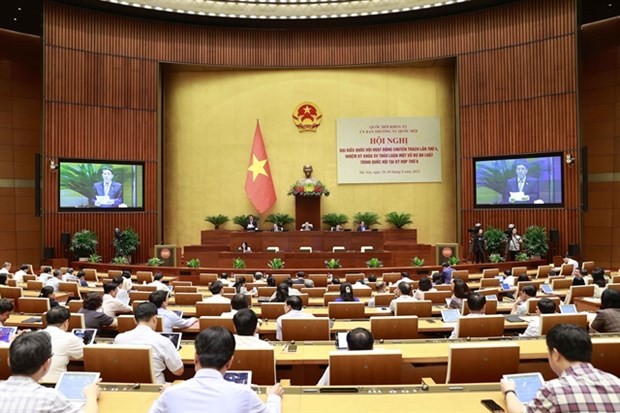
Full-time NA deputies discuss Land Law, focusing on land acquisition, appraisal
Latest
 |
| Full-time NA deputies discuss land acquisition, appraisal methods: An overview of the NA Standing Committee's session discussing the amended Land Law. (Photo: VNA) |
During the conference, Chairman of the NA's Economic Committee Vu Hong Thanh emphasised that this was a significant legislative project with broad regulatory scope and complex, leaving impacts on the lives of citizens and socio-economic development.
The provisions in the draft amended law were merely preliminary as consensus had not yet been reached on the best approach for amending the draft law, he added.
Regarding land acquisition for promoting socio-economic development, many deputies stated that the provisions listing cases of land acquisition by the State were rigid and did not fully reflect or address various issues.
Thanh argued that listing specific cases of land acquisition for national and public interests had the advantage of clarity, ease of monitoring, and practical application. However, listing overly specific and detailed projects and cases might fail to provide comprehensive coverage.
During the discussions, some argued that the current approach of listing cases did not sufficiently demonstrate the necessity of these projects and land acquisition activities in accordance with Resolution No. 54/NQ-CP.
Thanh concurred with cases where the State reclaimed land to regulate discrepancies in value resulting from changes in planning and infrastructure investment, balancing the interests of the State, citizens, investors, and ensuring that land use for investment projects generated new revenue for the State budget and overall benefits for society.
For individuals whose land was reclamed, the State would provide compensation, support, and resettlement as stipulated. All options needed further research, clarification, and adjustments to ensure clear, reasonable, and feasible regulations.
Regarding cases of selecting investors through bidding for projects involving land use, Thanh explained that the 2013 Bidding Law and the Government Decree No. 25/2020/NĐ-CP provide detailed regulations for selecting investors.
However, the current bidding laws primarily applied to projects that use land for commercial and business purposes. Other projects, whether they involved land use, were determined by specialised laws.
He said it was essential to clarify the amended Land Law to address cases of investor selection when land was either the primary or secondary asset.
There were several suggestions specifying the methods for determining land prices.
Some opinions argued that the draft law outlined a plan that benefited the State budget but didn't clearly define specific benefits. Some proposed not including specific land valuation methods in the draft law while others disagreed with the proposal to eliminate the surplus method.
In response to NA deputies’ opinions concerning land prices, the provision about selecting the method based on the most beneficial for the State budget principle would be replaced with regulations specifying the applicable cases for each specific method.
Additionally, the surplus method would be integrated into the comparative method instead of the independent land valuation method.
Thanh said the draft law introduced the surplus method as one of the land price determination methods and supplemented corresponding provisions regarding the principles and conditions of its application.
However, the conditions for applying this method had been narrowed down compared to the current regulations. These aspects were being revised and supplemented in the draft decree amending Government Decree No. 44/2014/NĐ-CP and continued to receive various opinions.
Thanh suggested that the Ministry of Natural Resources and Environment continue to collaborate with relevant agencies to carefully study land price determination methods.
It was essential to provide a comprehensive explanation and clarity regarding the content, ensuring that the regulations in the law guarantee stability and feasibility, in accordance with the spirit of Resolution No. 18-NQ/TW, he said.









